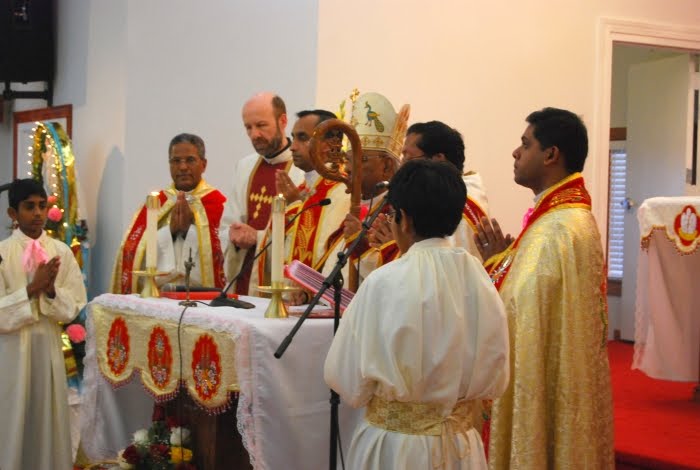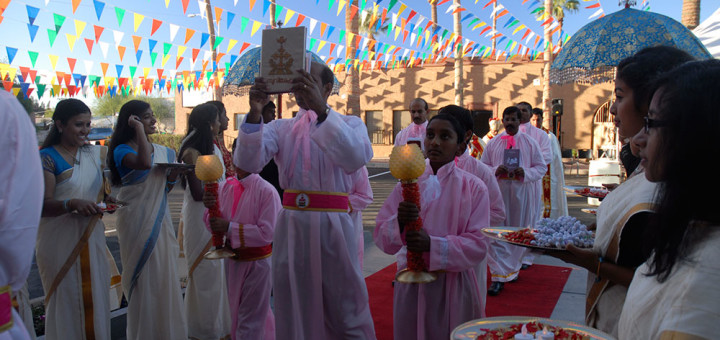 I was, more or less, a church goer ever since my settling down in Kanjirapally in November 2000 with a view to integrating myself with the local milieu. Being physically tired of waking up as early as 5.00 a.m. to attend the Sunday Mass with ‘sapra’ at 6.30 a.m. self and spouse started attending the Mass at 10.00 a.m. Everything was going on fine till a new vicar, who was also a Chancellor of the diocese, took charge. On the first Sunday of his arrival, he tagged two baptisms along with the Mass at 10 .00 A.M which dragged on till noon. To cap it all, he asked the mothers to stay back in the church; Sunday being the day of Sabbath. While he would have his lunch provided by the local convent, unless we return home and prepare food, we would have been forced to go hungry. From that day onwards I gave a wide berth to the Sunday Mass at the parish church. On an occasion I had to tell the local bishop that any Mass or function of the church, which might last more than 45 minutes would not be acceptable to me. He did not raise any objection in the matter. I have not faced any adverse consequences in not attending the Sunday Mass for the last 10 years. The people around are aware of my stand.
I was, more or less, a church goer ever since my settling down in Kanjirapally in November 2000 with a view to integrating myself with the local milieu. Being physically tired of waking up as early as 5.00 a.m. to attend the Sunday Mass with ‘sapra’ at 6.30 a.m. self and spouse started attending the Mass at 10.00 a.m. Everything was going on fine till a new vicar, who was also a Chancellor of the diocese, took charge. On the first Sunday of his arrival, he tagged two baptisms along with the Mass at 10 .00 A.M which dragged on till noon. To cap it all, he asked the mothers to stay back in the church; Sunday being the day of Sabbath. While he would have his lunch provided by the local convent, unless we return home and prepare food, we would have been forced to go hungry. From that day onwards I gave a wide berth to the Sunday Mass at the parish church. On an occasion I had to tell the local bishop that any Mass or function of the church, which might last more than 45 minutes would not be acceptable to me. He did not raise any objection in the matter. I have not faced any adverse consequences in not attending the Sunday Mass for the last 10 years. The people around are aware of my stand.
The “anointed” hero above had also announced that he would be undertaking a collection drive for some dubious purposes along with the blessing of homes of the parishioner’s. Tactfully he was denied of access to my home. On all matters his word must be treated as final. The not‐ so‐ well‐to‐do parishioners had to fund the “chosen” one’s many futile and idiosyncratic projects.
While in UK in 2005 I attended a Sunday Mas in the Holy Rosary Catholic Church, Sutton. The first Mass at 8.30 a.m. ended at 9.00 AM sharp including the sermon and the receipt of the Eucharist. There, for the first time, I saw people sipping the consecrated wine direct from the chalice along with the Host. The most surprising experience was seeing the smiling celebrant waiting at the door of the church greeting the congregation. This experience became handy in the aforesaid encounter with the bishop.
On a Wednesday evening in this April, we got the news of a death in the family. Someone wanted to pray in a nearby Catholic Church but found it locked. There was nobody around the church when we reached it around 6.00 p.m. We drove around Cheam and Sutton looking for a church of any denomination, but found all of them shuttered. It was found subsequently. that the churches of all Christian denominations have holiday on Wednesday in the area. On the next day, i.e. Thursday, we reached St. Christopher, Catholic Church, Tabor Gardens, Cheam at 8. 30 a.m. and found less than a dozen elderly people, mostly ladies, praying. On being told of the loss in the family, they dedicated the prayer for the departed soul. The Mass at 9.00 a.m. ended by 9.20 a.m. The priest did not hog the whole affair but gave the women assisting him due consideration. There is no morning service on Saturday, the Mass at 6.00 p.m. is the first Mass of the ensuing Sunday. The weekday Mass on Monday is at 10.00 a.m. On other days, i.e. Tuesday, Thursday, and Friday, the Mass commences at 9.00 a.m. The masses invariably lasts for less than half‐an‐hour all assisted by ladies. The priest thanks the participants after the service. After the Friday Mass I was invited for a repast, which I politely declined. Everybody seems to be very courteous. The timing for Sunday; first Mass 8.30 a.m, The second at 10.00 AM for children with catechism (no prolonged Sunday catechism classes lasting hours) and the last one at 12.00 noon. The priest at the Cheam Church being elderly, the Sunday Mass I attended lasted about 40 minutes with almost every one of the participants, about 50, receiving the Holy Communion. While the Host is given by the officiating priest, wine is given by pairs of men and women standing on both sides of the priest. In addition to thanking the congregation from the front of the alter, the priest came down to the door of the church shaking hands of each and every one with a smiling face.
Once the morning service is over, the church is locked and the keys are in the custody of a lady of Indian origin. On a Saturday morning, she obliged us by opening the church for praying during the time the funeral was to take place at 2.00 p.m. (India) 9.30 AM (UK.) What a contrast to the behaviour of our haughty Syrian Catholic priests in Kerala with the alleged hoary heritage of two thousand years of Christianity. They care a tuppence to the message of love compassion and humanness enunciated by Jesus. The authoritarian attitudes and the lack of respect and consideration to the members of the Church, it's very backbone, especially to the disadvantaged, by many clerics are unwelcome tendencies to say the least.
Here in UK the church goes to the people. In Kerala, laity is expected to be at the bid call of the clergy and toe the line of the Church with implicit obedience and demure. Their life problems are of no concern to the church leadership. The Ecclesiastics by and large arrogates themselves as the embodiment of all wisdom. It may be better if they are aware that in this 21st century, with information available with the touch of finger, even a child in the primary school is well ahead in the field of knowledge. In the existing order of things in the Kerala Church, only the privileged and the powerful are treated with deference; the ordinary folk are mostly berated and treated with contempt, at best with condescension. There is no social or financial accountability in the system. One often wonders whether the dioceses in Kerala are bent upon becoming stand alone commercial and financial agglomerates to the exclusion of the teaching of Jesus.
I haven’t come across any Church procession during the course of my long duration four visits in these parts of U. K. The people here may not be of churching type but the courtesies shown while walking on the streets, crossing the roads or driving the vehicles, standing in line at the supermarket counter are examples of their manners, which are worthy of emulation.
I had the opportunity to be in the Westminster Cathedral during a Sunday Mass. The whole ambiance of the church, with diffused lighting, soothing music, low key intonations, unhurried service and uncluttered (of statues) space, instill peace and tranquility to the whole being. Everyone of the participating members sit quietly, no bowing and kneeling, no wild gesticulations. It is with reluctance that I left the Church. Incidentally I observed two conspicuous notice boards urging people to enjoy freshly made food at the Cathedral cafeteria.
How can one get any concentration and uplifting of mind during the unduly prolonged Qurbana with mishmash of meaningless and repetitive prayers lifted and copied, God knows, from where. The worship does not ennoble the mind; it does not give priority to the messages of Jesus? Why the word “debt”, connoting a purely commercial transaction, in the prayer, beginning with “ Our Father” taught by Jesus himself (Matthew) has been deliberately interpolated with the word “sin”. One should applaud the gumption of the priest who did correct the words of the Saviour himself. One wonders whether the foundation of the edifice that is the church is built on the so called “fall of man”, the primeval myth. Is it because “sin” and guilt is the stick with which the Catholic Church controls the laity, the “goats”? One may feel a shudder even to think of the insufferable church ceremonies in connection with marriages (to quote Bernard Shah ‘the public confession of a private sin’), “water dunking“ (the expression for baptism, borrowed from a writer in the Guardian (U. K.) and all other irritatingly time consuming rites of the Kerala Church.
A religion that fosters harmony and peace in the human domain; that fosters overall happiness of people; that recognises the beauty of the nature around us, seems to be preferable to the one that harps on sin, hell and damnation. A religion that exploits the inherent anxiety and fear, mental disequilibrium, disharmony and uncertainty in the human psyche may better be kept at a safe distance. A religion that denies the wonder that is life and degrades its normal and natural activities as sin; that glorify poverty and suffering may not be everyone’s cup of tea.
Sitting and contemplating quietly under a leafy tree without being disturbed either by the noisy and gesticulating crowd or the whirling dervishes, may be an experience worth looking for. The smiling face of a child, a beautiful human being, a freshly opened flower, a dew laden blade of grass, glow worms flitting by in a dark night, a star studded clear sky, the rays of the morning sun peeping over the nearby hill, the varied hues of the setting sun, soothing music and sublime artistic creations could give peace and tranquility. Why should consciousness and faculties be surrendered to some meaningless charades and melodrama. Despite the uncertainties and phobias, disappointments arising out of unbridled desires and expectations, this life is all what we seem to have. It defies common sense to view the body an abode of evil and prone to sin. One can create hell on the earth and make one’s existence miserable by believing in phantoms emerging from thin air.
Vergese Pamplanil. Mob. 944725253

